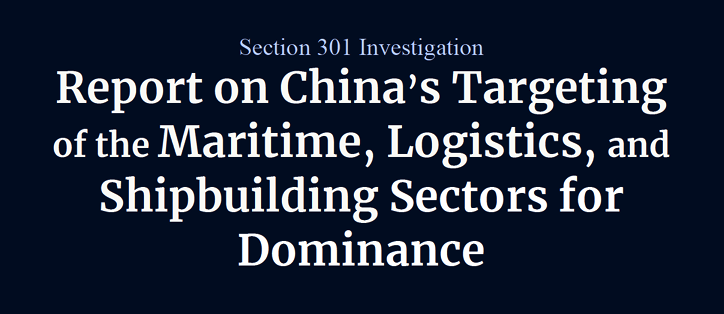On April 17, 2025, the Office of the U.S. Trade Representative (USTR) released formal findings under Section 301 of the Trade Act of 1974, concluding that China’s acts, policies, and practices targeting the maritime, logistics, and shipbuilding sectors are unreasonable and restrict U.S. commerce. The determination follows a year-long investigation and outlines a two-phase enforcement plan that includes service fees, operational restrictions, and proposed tariffs intended to address identified market distortions.
These actions parallel the White House’s April 9 Maritime Executive Order and are intended to strengthen U.S. maritime manufacturing while minimizing disruption to exporters.
SECTION 301 INVESTIGATION: FINDINGS AND BASIS FOR ACTION
USTR determined that China’s efforts to dominate key maritime and logistics sectors displace foreign firms, reduce market-driven competition, and increase dependency on Chinese-built infrastructure. These findings are based on information gathered from public comments, a two-day hearing, and interagency consultation.
The investigation began in response to a March 2024 petition submitted by five national labor unions: the United Steelworkers (USW), International Association of Machinists and Aerospace Workers (IAM), International Brotherhood of Boilermakers (IBB), International Brotherhood of Electrical Workers (IBEW), and the Maritime Trades Department, AFL-CIO (MTD).
USTR MARITIME ACTION PLAN
As part of the broader federal maritime strategy, the April 9 executive order mandates the creation of a Maritime Action Plan (MAP) to develop strategies for revitalizing U.S. shipbuilding and port infrastructure. The MAP is intended to address inefficiencies in past procurement processes and regulatory delays that have hindered timely, cost-effective vessel construction. The plan is scheduled for publication within 180 days of the order’s signing.
PHASED IMPLEMENTATION FRAMEWORK
To support a transition period for affected stakeholders, service fees will remain at $0 for the first 180 days.
After that period, the following measures will be implemented:
Fees on vessel owners and operators of Chinese-flagged ships, assessed per U.S. voyage based on net tonnage, with gradual increases over time.
Fees on operators of Chinese-built ships, regardless of flag, are based on either net tonnage or container volume.
Capacity-based fees on foreign-built car carrier vessels to encourage demand for U.S.-built alternatives.
LNG TRANSPORT RESTRICTIONS TO PHASE IN STARTING 2028
Beginning in 2028, limited restrictions on transporting liquified natural gas (LNG) via foreign-built vessels will be introduced. These restrictions will expand incrementally over a 22-year period to encourage domestic LNG vessel construction.
PROPOSED TARIFFS ON CRANES AND CARGO HANDLING EQUIPMENT
USTR is evaluating public feedback on proposed tariffs targeting imported ship-to-shore cranes and related port-handling infrastructure. The potential tariff schedule aligns with the national infrastructure and supply chain security goals in the April 9 executive order.
Stay up-to-date on freight news with Green’s Weekly Freight Market Update by following us on LinkedIn. For continuous updates, make sure to check out our website at greenworldwide.com.



